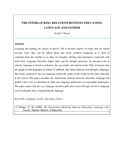| dc.contributor.author | Wango, Geoffrey Mbugua | |
| dc.date.accessioned | 2013-06-19T14:33:06Z | |
| dc.date.available | 2013-06-19T14:33:06Z | |
| dc.date.issued | 1999 | |
| dc.identifier.citation | Wango, GM.1999. The Interlocking Relations Between Education, Language and Gender. Ministry of Education. , Nairobi | en |
| dc.identifier.uri | http://profiles.uonbi.ac.ke/gwango/publications/interlocking-relations-between-education-language-and-gender | |
| dc.identifier.uri | http://hdl.handle.net/11295/36366 | |
| dc.description.abstract | Language and naming are sources of
power. This is because aspects of reality that are named
become ‘real’; they can be talked about
and easily outlined. Language as a form of
communication also enables us to share our tho
ughts, feelings and experi
ences, especi
ally with
each other. Language therefore shapes ideas a
nd the thought processes.
In education and in
schools, language is bound to infl
uence the way pupils and students
learn. This is because they
are taught several la
nguages in school. In addi
tion, they learn whatever
else through
a language.
This draws attention to the way
language creates the reality of th
e world for the child especially
in the school. This paper exam
ines the interlocking
relations between educ
ation, language and
gender with a view to: determine in what ways
language perpetuates sex a
nd gender stereotypes.
The paper argues that the way
language devalues gi
rls and women through
sexism in language
can be redeemed, that is
engendering th
e language. | en |
| dc.language.iso | en | en |
| dc.publisher | University of Nairobi. | en |
| dc.subject | Language | en |
| dc.subject | sexism | en |
| dc.subject | education | en |
| dc.subject | schools | en |
| dc.title | The Interlocking Relations Between Education, Language and Gender | en |
| dc.type | Working Paper | en |
| local.publisher | College of Education and External Studies | en |

